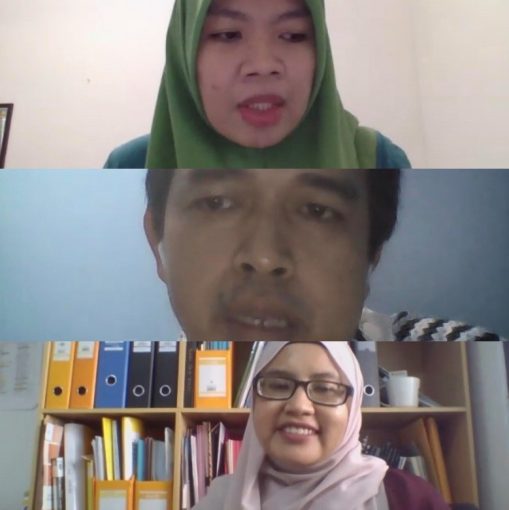
Yogyakarta, 5 July 2020—Serial discussion Ngopi (Ngobrol Pagi) #4 was virtually held on 5 July, 2020, discussing the pandemic, institutional capacity-building, and development of online people’s market. Departemen Ilmu Komunikasi/Department of Communication Sciences UGM as the organizer of the event invited Dr. Hempri Suyatna, S. Sos., M.Si. as a lecturer in the Department of Social Development and Welfare UGM, Rindu Sanubari Mashita Firdaus, S.I.P., M.Sc. as a researcher in the Center for Studies on People’s Economy, and Achniah Damayanti, S.I.P., M.Sc. as a lecturer in the Department of Communication Sciences UGM. The two-hour discussion provided insights on the existence of people’s market during the pandemic, which had to adapt with innovations, as well as overcome challenges by shifting into a virtual market.
Hempri Suyatna began the discussion by highlighting the importance of people’s market–interchangable with traditional (grocery) market–in the economy. In the midst of pandemic, stigma against traditional market influenced the existence of the market adversely, as traditional market is known to enable massive COVID-19 transmission. The fact that initial spread of the virus happened in an animal market in Wuhan, China, made the stigma worse. Said negative image forced the market to face different challenges, one of them the decrease in income as a result of drastic decline in number of physical transaction. Lack of knowledge regarding health protocols also hinder the conduct of people’s market.
Before the pandemic, merchants in people’s market already faced the obstacle of revitalization, Rindu Sanubari added. Government’s revitalization tends to prioritize physical improvement of the building, leaving out participation of merchants. Such issue requires a cooperative institutional reinforcement which involves merchants meaningfully in running people’s market. Rindu also noted that a capacity building amongst merchants is necessary in order to empower them in running the market. Such effort can be done by, for instance, enrolling merchants in certain courses regarding conduct of the market.
Institutional reinforcement in different forms, such as cooperatives and tight-knit community organizations, need to overcome certain challenges. According to Rindu, limitation in physical interaction will remain the biggest challenge to people’s market. However, the pandemic gives a good opportunity for the market to advance, as the situation demands adaptation and survival. In the end, challenges and opportunities posed by the pandemic will drive people’s market into adopting innovations in order to survive the crisis.
To Achniah Damayanti, adopting innovation needs to pass different stages, starting with viewing the issues, analyzing internal and external factors, planning and implementing, and ending with evaluation. In an effort to further explain the process of adopting an innovation, Achniah provided instances of online platforms like Pasar Sambilegi.id, which was created as a response to shifting from physical to virtual market. In perceiving the issues, Pasar Sambilegi.id noted that the problem lies in decrease in sales, decrease in income, and risk of transmission in physical market. The problem, then, drove Pasar Sambilegi into an analysis of internal factors that needs to be taken into account in the realization of a virtual market, including virtual transactions features on Whatsapp, different literacy rates, and enthusiasm in the idea of market revitalization. Meanwhile, external analysis provided information that there is a government attempt in designing a digital market roadmap, community empowerment program, and the existence of e-commerce platforms.
The analysis helped in implementing the ideas, where Pasar Sambilegi.id ensures inclusivity, justice, development of customer basis, utilization of social capital, and collaboration with government or relevant industry in order to strengthen suprastructure and infrastructure take place in their platform. Overall, the pandemic stimulates people’s market into much-needed adaptation, including through shifting into online shopping platform that requires tech-based humans, strong institutions, and just system.
